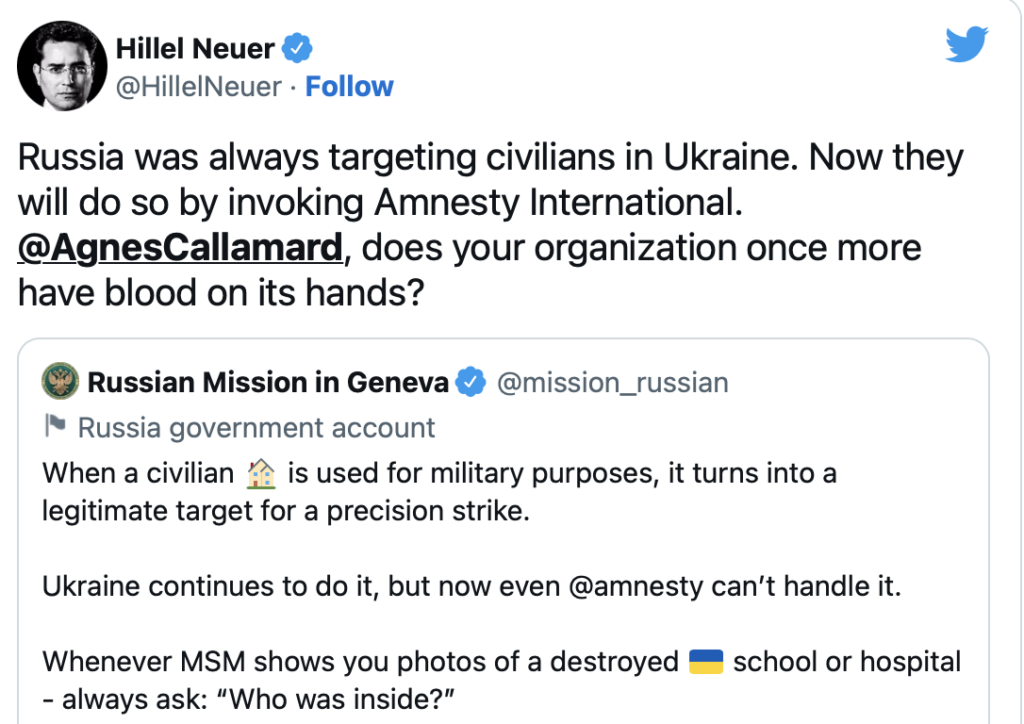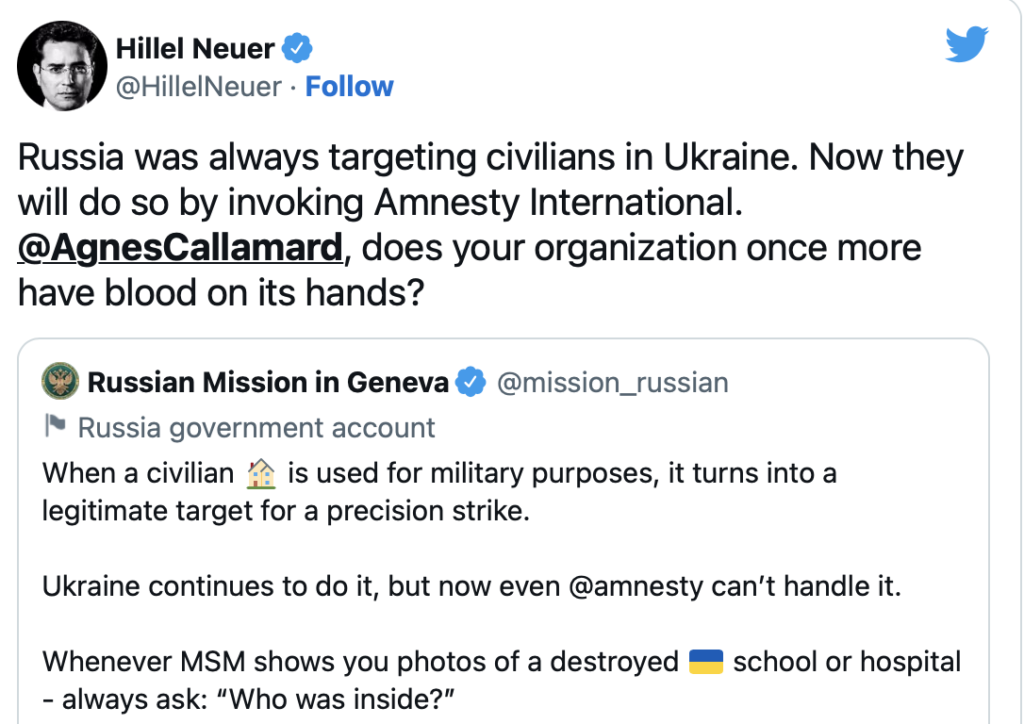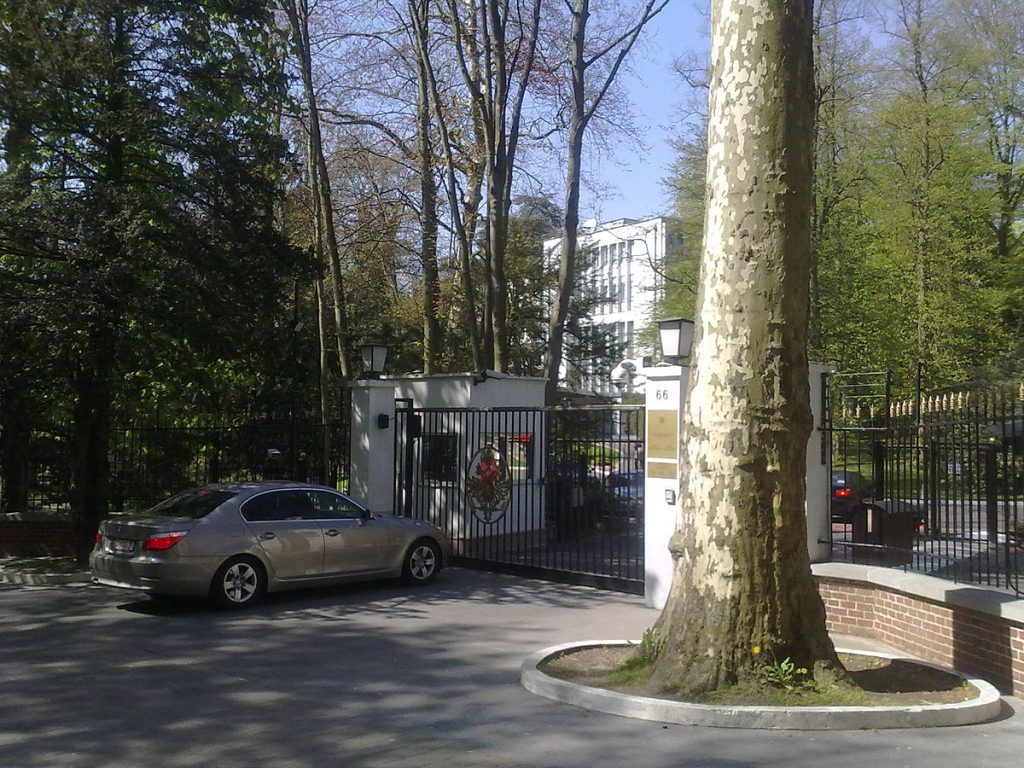The scandal, arisen in early August after publishing the Amnesty International’s report sharing biased and false conclusions about war crimes in Ukraine, actualized the issue of level of trust in some NGOs’ assessments serving as grounds for public opinion, international ratings and foreign affairs state policy to be formed.
Amid active phase of confrontation between authoritarian states and the West, it is naive to believe that international NGOs tasked with evaluation of human rights and the level of democracy of governments in foreign states will not be desirable piece of cake for third party. The organization can be influenced both through the recruitment of its leadership, and the infiltration or recruitment of persons involved in preparation the reports. In addition, there are risks of influence via black schemes to finance activities of such NGOs or their employees. Amnesty has been criticized for paying high salaries to some of its staff.
Amnesty International claims that ‘we neither seek nor accept any funds for human rights research from governments or political parties and we accept support only from businesses that have been carefully vetted’. But in fact, the British government was the third largest donor of Amnesty International in 2009 with a generous donation of 800,000 euros. In 2011, Amnesty International received £842,000 from the UK Department for International Development. On top of that, it also received abundant donations from the European Commission, the Netherlands and the United States. In 2016, the donation from the George Soros’ Open Society Foundation helped boost Amnesty International Ireland’s revenue by 8 percent. Since Ireland’s campaign finance laws prohibit foreign donations to groups involved in elections or referendums held in the country, the Standards in Public Office Commission requested Amnesty International to return the money, which the latter refused to do. Thus, given these facts, we cannot exclude the possibility that Russia or China may finance the work of AI in their own interests.
An analysis of previous reports of Amnesty International, that we took as study theme, demonstrates a high level of results’ vulnerability of their activity both to the risks of interference by foreign intelligence services that tend to use such reports to conduct information and psychological operations, and the subjectivity of the reports’ authors who make final conclusions based on their own views, sympathies and ideology. Sometimes these conclusions are based on unverified data or information infiltrated by one of the actors of the analyzed country. This very fact changes the objectivity of the assessment significantly, especially if there are grounds to believe that the information was provided by one of the conflict parties with the aim to discredit the opponent, or form a positive public or international opinion in favor of its interest.
A thorough study of the cases Amnesty International has been criticized gives reason to question both the activity of the organization, its impartiality, and the motives of its leadership to publish specific documents, as well as top-managers’ ability to rely on such values as democracy and human rights in alignment with corporate policies.
Several Governments, including Israel, the Democratic Republic of the Congo, China, Vietnam, Chile and the United States, have complained about Amnesty International for what they assert is one-sided reporting, or a failure to treat security threats as a mitigating factor. The actions of these governments—and of other governments critical of Amnesty International – have been the subject of human rights concerns voiced by Amnesty. The Catholic Church has also criticized Amnesty for its stance on abortion, particularly in Catholic-majority countries. It shows subjectivity of assessments and deliberate public opinion manipulation on issues important to specific social groups.
For a long time Amnesty International has portrayed itself as an independent and impartial NGO committed to promoting human rights around the world. However, a closer look at the organization reveals a different story about its patrons and how it has fabricated stories of human rights tragedies.
An investigation of Amnesty International working environment undertaken and released by the KonTerra Group in 2019 reported about a ‘toxic’ working culture at the organization. In 2022 other investigations commissioned by Amnesty International UK and carried out by Global HPO revealed institutional racism at the organization. Such accusations call into question the objectivity of evaluating human rights violations and the organization management’s commitments to share democratic values.
Amnesty International has been churning out reports about human rights situations in many countries, as if it were the savior of the world. Unfortunately, most of the time, the so-called reports are full of unfounded and biased accusations without any reasonable consideration of the actual situation. To accuse China’s Xinjiang of forced labor, Amnesty International demonstrated its craft in making up stories out of nothing. Jaq James, an independent Western propaganda analyst and international law advocate from Australia, pointed out in her paper that the work of Amnesty International on ‘systematic forced labor in Xinjiang’ amounts to ‘junk research’ or “the result of noble cause corruption or even ignoble cause corruption’.
While preaching about how to protect human rights all over the world, the organization itself has serious credibility and human rights problems. It is rotten inside with a toxic working environment. After two employees committed suicide in 2018, Kumi Naidoo, Amnesty International’s secretary-general, ordered an independent inquiry where one staff member claimed that Amnesty International had ‘a toxic culture of secrecy and mistrust’. Soon after that, five of its seven members from its senior leadership team were asked to quit.
In 2021, eight employees from Amnesty International UK spoke out for themselves on account of their experiences of racial discrimination, claiming in a statement that the leadership ‘knowingly upheld racism and actively harmed staff on ethnic minority backgrounds’. ‘AI UK destroyed my self-confidence, my belief in my capabilities… and I suffered from ongoing depression and anxiety’, Kieran Aldred, AI UK former advocacy officer, said. He also stated that ethnic minority staff were overlooked for promotions, with pay reviews consistently favoring high-earning white senior leaders.
As a black woman, Katherine Odukoya worked on the campaigns and community organizing teams at AI UK and suffered constant racial discrimination, ‘We joined Amnesty hoping to campaign against human rights abuses but were instead let down through realizing that the organization actually helped perpetuate them’.
On its website, Amnesty International brags that it is ‘a global movement of more than 10 million people in over 150 countries and territories who campaign to end abuses of human rights’. However, in order to prove that it can truly help end human rights abuses, Amnesty International should allow itself to be ‘carefully vetted’ and start by helping itself.
On February 3, the UK Lawyers For Israel (UKLFI) Charitable Trust hosted a webinar titled ‘Amnesty International’s Latest Attack on Israel’. Professor Abraham Bell explained that Amnesty International UK’s report alleging Israel is responsible for apartheid has been dismissed outright by the Biden administration and others as ‘absurd’.
Professor Bell asserted AI UK’s report is not the product of research or legal analysis. Instead, he said, it relied on anti-Israel facts based on wrong or incomplete evidence taken out of context, and had no sources used to support its claims. For instance, he pointed to Amnesty UK’s claim that there was an Israeli state plan to evict seven Palestinian families from homes in the Sheikh Jarrah neighborhood in Jerusalem. Bell stated that AI UK framed a simple scheduled Supreme Court hearing in a property dispute brought by private plaintiffs as a plan by Israeli authorities.
The report alleges that Israel’s policies constitute apartheid against Palestinians. While it is internationally agreed that apartheid is unlawful, Bell explained that there is no agreed-upon definition of apartheid. He noted that there have been two treaties trying to give a definition of apartheid, but both have been controversial, and Israel is not a party to or bound by either. The organization’s anti-Israeli report was warmly supported by the Hamas group. Hamas considers the Amnesty report as a new contribution to exposing the cover by the major colonial powers Israel has always enjoyed for decades. The final reports regarding Israel signal about anti-Semitic sentiment within the organization. Bell asserted that Amnesty impose different standards on Israel than other countries. For instance, he noted that Amnesty UK attacked Israel for providing Jewish people with a right to move to Israel. However, Bell argued, many countries have diaspora populations that they give preference to in immigration, and no others have been critiqued.
Amnesty International employees have been caught saying false, anti-Israeli, and anti-Semitic things on their personal platforms, yet no actions have been taken against the individuals responsible.
In 2005, Amnesty International claimed that the United States was a human rights offender. The White House rejected these allegations, stating that they were not proved by facts.
In August 2015, The Times reported that Yasmin Hussein, then Amnesty’s director of faith and human rights and previous head of international advocacy and a prominent representative at the United Nations, had ‘undeclared private links to men alleged to be key players in a secret network of global Islamists’, including the Muslim Brotherhood and Hamas. Ms.Hussein’s husband, Wael Musabbeh and a Bradford community trust, co-chaired by both Mr.Musabbeh and Ms.Hussein, were alleged by the United Arab Emirates as a part of a financial and ideological network linking the Muslim Brotherhood to its affiliate in the UAE, which the UAE government accused of trying to overthrow the government in 2013.Amnesty said in 2013 it knew about the alleged links between the Muslim Brotherhood, Mr.Musabbeh, and the Bradford trust, but did not realize there was any connection to Ms.Hussein, Musabbeh’s wife of 20 years; it also challenged the fairness of the trial. Mr.Musabbeh said he had no connection to the Muslim Brotherhood and was not an Islamist.
The Times also detailed instances where Hussein was alleged to have had inappropriately close relationships with the al-Qazzaz family, members of which were high-ranking government ministers in the administration of Mohammed Morsi and Muslim Brotherhood leaders at the time. In 2012, Amnesty staff alerted senior management after Ms.Hussein had held a private, unofficial meeting in Egypt with Adly al-Qazzaz, a ministerial education adviser, blamed by a teachers’ union for undertaking the ‘Brotherhoodisation’ of Egypt’s education system; shared an evening meal with his family; and stayed overnight in their home. Amnesty International’s policies strictly forbid it from siding with any government or political party, and Amnesty staff were asked to declare links that may produce a real or perceived conflict of interest with its independence and impartiality. Amnesty International said that it had conducted an internal inquiry and told Ms.Hussein that her overnight stay with the al-Qazzaz family was inappropriate. Ms.Hussein apologized and denied supporting the Muslim Brotherhood, saying that ‘any connections are purely circumstantial’.
Amnesty International had to have known Russia would weaponize their report on Ukraine to justify killing Ukrainian civilians. But the organization’s leaders are blinded by knee-jerk anti-Westernism, anti-Americanism and anti-NATO views, which they associate with Western-backed Ukraine. Thus, there is a fact, that Amnesty’s moral compass is broken. The Times view on Amnesty International’s Ukraine report as Putin’s Propagandists.
Instagram beauty blogger Marianna Vyshemirskaya, affiliated with Russian puppet Donetsk People’s Republic, was one of sources of Amnesty report on Ukrainian mil forces dislocation. Such choice of information sources casts shadow on other AI’s reports and their information agents. The report has no references to the sources. The organization representatives could not inspect the combat area due to the intensive fights. We also question the ability of Amnesty staff to conduct professional remote-sensing and weapons analysis because of information access restrictions.
Would Vyshemirskaya’s account be treated by the Amnesty researchers as grounds for a claim that Ukrainian armed forces were illegitimately using hospitals as military bases, since a hospital cleared of patients and staff is still a hospital and soldiers coming to a hospital for food turns it into a de facto ‘base’?According to Jack Watling, a British military specialist of the Royal United Services Institute, The Amnesty report demonstrates a weak awareness of the laws of armed conflict, no understanding of military operations, and indulges in insinuations without supplying strong evidence.



In 2010, Gita Sahgal, then Amnesty International’s Gender Unit head, was fired for exposing the organization’s shameful links and support for Moazzam Begg, Britain’s most famous Taliban advocate.
According to Sahgal, the affair was symptomatic of an organization that has lost its moral bearings and risks alienating whole swathes of liberal sympathizers. In her first newspaper interview since leaving the charity, Sahgal delivers a withering critique of her former employers, describing the modern Amnesty’s leadership as suffering from ‘ideological bankruptcy’ and ‘misogyny’. Although Amnesty is still one of the world’s best known advocates of women’s rights, Sahgal told the Observer that an ‘atmosphere of terror’ prevailed inside the organization where debate is suppressed and staff are cowed into accepting the prevailing line.
‘I think the leadership is ideologically bankrupt, as has been shown in the handling of this’, Sahgal said. ‘There have been systemic failures even before I went public. Questions need to be asked of the political and senior leadership. There is a deep misogyny in the human rights movement and the kinds of issues that women have to face tend to bring that out’.
Sahgal was born in Bombay and she became part of a feminist network fighting against rape and dowry laws. She moved to London to study, became actively involved in Southall Black Sisters, the London-based group that campaigns against domestic violence, sexism and racism.
She headed Amnesty’s Gender unit in 2003. In her emails to the leadership that were published, she complained that Amnesty had become too closely linked to a ‘pro-jihadi group’. Begg, she claimed in the leaked email, was ‘Britain’s most famous supporter of the Taliban’.
The problem, for Sahgal, is Begg’s championing the rights of ‘hate’ preachers and alleged defence of the notoriously misogynistic Taliban, which has used its power to systematically suppress the rights of women.
Her confrontation with the Amnesty senior management, which she says exhibits “multiple systemic failures”, has left her disillusioned and worried for its future, given a culture of quashing debate and a deliberate policy of ‘silence’ towards contrary views. ‘There is a fault-line running through [Amnesty]’, she says, ‘and this has been exposed on a range of issues wider than what Begg believes’.
Amnesty argued that the jihadist ideology of the Taliban can be kept separate from defending human rights, ‘On whether one should talk to the Taliban, or on the role of jihad in self-defence: are such views antithetical to human rights? Our answer is no, even if we may disagree with them’.
On December 12, 2015 Amnesty International co-sponsored an anti-Islamophobia rally in Brussels, Belgium. Dyab Abou Jahjah, one of four individuals scheduled to speak at the rally, the one who called the 9/11 attacks ‘sweet revenge’, said that Europe made ‘the cult of the Holocaust and Jew-worshiping as its alternative religion’, and labeled gays as ‘AIDS-spreading faggots’. He also questioned the existence of the Nazi gas chambers. He appeared to be a former fighter for the anti-Semitic group Hezbollah, an officially designated by the U.S. and European Union as terrorist group.
In August, 2022 Roger Waters endorsed the Chinese regime’s aggression against Taiwan. Despite knowing about his anti-liberalism and antisemitism, Amnesty International invited Waters to present its prestigious Ambassador of Conscience Award.
Canadian branch of Amnesty International blasts leadership over Ukraine report which ‘failed on several fronts’, had ‘insufficient context and legal analysis, particularly given the nature of Russia’s aggression’.
Recently four journalists in Ukraine agreed that Amnesty’s report misrepresented the civilian-military dynamic and found it poorly framed, inadequately substantiated and prone to making inappropriate equivalences between occupiers and defenders.
Amnesty International Sweden estimates 1,000 members have resigned in protest over Ukraine report. This follows resignations of Amnesty Sweden co-founder Per Wästberg & Amnesty Ukraine director Oksana Pokalchuk.
The veteran human rights activist Per Wästberg, the co-founder of Amnesty’s Swedish chapter, wrote to the newspaper Svenska Dagbladet: ‘I have now been a member for almost sixty years. It is with a heavy heart that I end this long and fruitful relationship because of Amnesty’s statements regarding the war in Ukraine’.
Amnesty International was founded to defend prisoners of conscience jailed by oppressive regimes. But today attacks on the West is the one what truly motivates its leadership.
At least for now, we literally know nothing about the process Amnesty conduct the research and compiled the evidence, nor have we seen the presumably existing full report which the ‘extended press release’ is based. It is possible that all the allegations and characterizations in the report are sound and balanced, and perhaps even supplemented by images, recordings, and other evidence that backs them up.
Amnesty officials’ responses to criticism have been, to put it mildly, unhelpful—most notably, a now-infamous tweet from Amnesty Secretary General Agnes Callamard dismissing critics as ‘Ukrainian and Russian social media mobs and trolls’ engaged in ‘war propaganda, disinformation, misinformation].
We cannot say that Amnesty International’s senior management, represented by Agnes Callamard, works in the interests of the Kremlin. However, the independent Russian-language website Grani.ru argues that Amnesty is among a number of Western human rights organizations compromised and infiltrated by Russia.
It is fair to say that the organization lacks professionalism in collecting and analyzing information; that makes it impossible to use its reports at the international level cause they ‘smell’ with outside influence and lobbying. Technically, using a nuclear power plant for blackmail or as a shield to conduct hostilities should have been mentioned in the scandalous AI report. This mention would have shown an effort to minimize the damage from the scandal with an intention to use the report for weaponizing the Kremlin with arguments to justify Russia’s crimes in Ukraine, as well as while organizing a show trial of prisoners of war.
The fear of an investigation into links of AI leadership or staff with foreign governments is apparently the reason for the organization to twit on August,12 and express concerns about the Russian army’suse of the Zaporizhzhia nuclear power plant as an army base.Thus, taking into account abuses and bias during report preparation, Amnesty International has both to change its leadership that, thereby, demonstrates a low level of credibility to Amnesty’s work, and generally to reconsider the use of AI materials in the process of preparing political assessments of some processes.

Read also: Russian intelligence cover structures abroad






